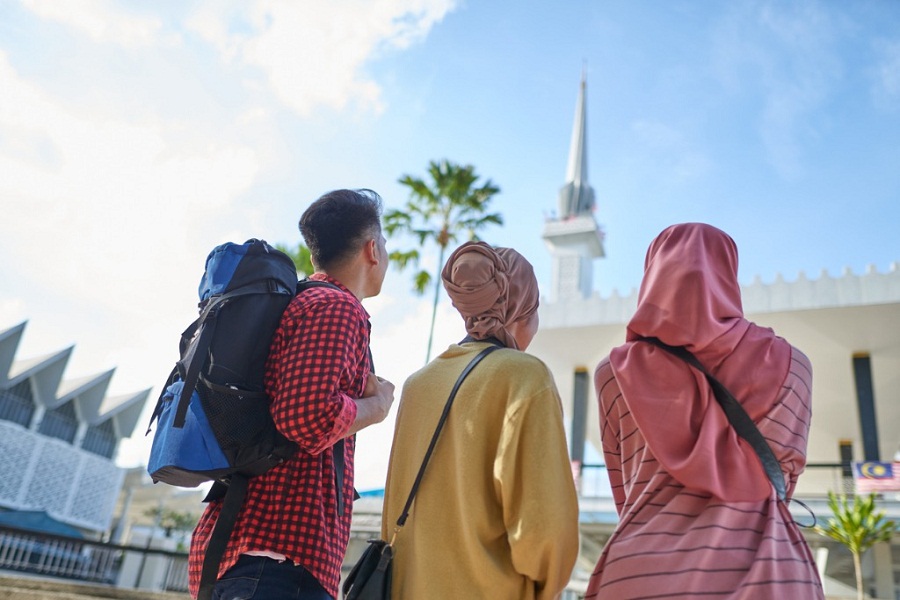
Published :
Updated :

The world is changing every sphere of its stridency, which inseminates new norms or restructures the existing ones, technically known as an adaptation to the realignment.
For economic growth, every country adopts different tactics, from strategic business operations to introducing uniqueness in the country's buildups, where following the Islamic strings in the national economy is incredibly crucial.
The concept of 'Halal Tourism' is one of the Islamic views regarding amplifying the tourism industry and maintaining the aphorism of the Holy Quran and Sunnah.
Halal tourism refers to the practice of an Islamic religion-centric lifestyle while travelling to different places nationally or internationally, having all of the components of the environment favourable to the lifestyle regarding Islam. The food, residence, institutional rules and regulations, and other genres of any particular place are convenient to a Muslim to inure in halal tourism.
According to the Global Muslim Travel Index, the total market size of halal tourism in the world was almost 220 billion USD in 2020. In another report published by Credence Research Inc., the halal tourism industry will reach 324.96 billion USD globally by 2030, where the Compound Annual Growth Rate (CAGR) is projected to be 4.07 per cent from 2023 to 2030.
One of the specialities of halal tourism is that it always focuses on hygienic foods and drinks, avoiding harmful components, including alcohol or other toxic ingredients.
Not only the foods, but this particular kind of tourism segment also emphasizes a decent lifestyle, which is free of petulant temperaments, for example, loud music, nightclubs, free mixing between men and women, etc., which create decorum among the people.
Of its unique characteristics, benevolent for both the physical and the social lifestyle, not only in Muslim precedence countries but also in other countries having the majority of people from other religious views besides Islam, halal tourism is creating acceptance among those people.
In fact, Thailand, Sri Lanka, Nepal, and multiple countries in Europe and North America have made this tourism segment a salient part of their existing tourism industry.
From the perspective of Bangladesh, Islam is a religion for almost 90 per cent of people; halal tourism can be a meaningful trail for the advancement of the tourism industry of this country.
According to the Global Muslim Travel Index, Bangladesh is in the top 20 Muslim-friendly countries in the world. Bangladesh has some traditional Muslim infrastructures, including the graveyard of Hazrat Shahjalal (Rah.), Hazrat Shah Paran (Rah.), and many more saints, Lalbagh Fort, Ahsan Manzil, Biswa Ijtema Field at Tongi, etc.
Moreover, the enchanting sites blessed with natural abundance make this country a gallant tourist spot for both the native and foreign people. But Bangladesh still has a lot to do regarding halal tourism.
Mallika Roy is the Associate Professor of the Department of Economics at the University of Chittagong. She is also a PhD Scholar at the School of Business and Law at Central Queensland University, Australia. She said, "Halal Tourism can create value in the national life through a number of ways. First of all, it gives importance to halal foods and drinks, where the drinks are alcohol-free, and the food quality is also wholesome. Besides, the animal protection issues are highly maintained in this system, which always plays a vital role in the natural ecosystem."
She also mentioned some points which are significant for the advancement of halal tourism practice in Bangladesh. She said, "The leading authorities of Bangladesh should give importance to providing certificates to the restaurants which maintain halal foods or cuisines in Bangladesh. At that time, the others will be interested in setting up restaurants in this way. Training to the related stakeholders given by the government is necessary in this issue."
Regarding the alliance in the international phase, she said, "The government can also work together with the Organisation of Islamic Cooperation (OIC) deeply to make the halal tourism concept and its application popular in Bangladesh."
Abu Morshed Chowdhury, President of Cox's Bazar Chamber of Commerce and Industry, said, "The people of this country tend to respond to the halal aspects, which works as a pathway to maintain the halal tourism practice easily."
"In Cox's Bazar, known as one of the most attractive tourist spots of Bangladesh, the authorities of residential facilities at the hotels, resorts, as well as other places are trying to introduce the practice of halal tourism in their different services, which may be escalated in the upcoming days", he added.
Tourism is an industry that survives by providing various services to tourists. In that sense, can Halal tourism play a significant role in attracting more tourists all around the world, or would it create a monopoly scenario?


 For all latest news, follow The Financial Express Google News channel.
For all latest news, follow The Financial Express Google News channel.